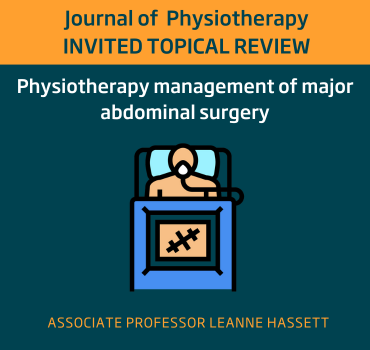Physiotherapy management of major abdominal surgery
Abdominal surgery is the most commonly performed type of major surgery conducted worldwide and physiotherapists have been integral to the postoperative ward-based management of patients since the 1950s. However, many patients are affected by postoperative complications and delayed functional recovery despite advances in surgical and anaesthetic techniques and the implementation of evidence-based multidisciplinary protocols including Enhanced Recovery After Surgery protocols aimed at reducing complications, improving recovery and shortening length of hospital stay.
Major abdominal surgery is typically performed under a general anaesthetic with an incision into the abdominal cavity and visceral manipulation. Major surgery requires at least an overnight stay for acute postoperative care. Abdominal surgery is performed for cancer, inflammatory bowel disease, conditions affecting the reproductive organs including ovarian cysts and endometriosis, gallstones, hernias and other gastrointestinal tract conditions.
Postoperative pulmonary complications (PPCs) are of particular concern, with about 20 per cent of patients developing a PPC after abdominal surgery, extending their stay in hospital for up to five days and increasing the likelihood of: unplanned readmission, poorer short and long-term quality of life and physical function, mortality within 12 months and increased costs. Other complications include wound infections, paralytic ileus, pulmonary emboli and deep vein thrombosis, as well as postoperative physical decline, particularly in elderly patients.
Currently, interventions delivered by hospital physiotherapists are primarily aimed at preventing PPCs. Studies have shown that pre- and postoperative physiotherapy as well as high-intensity supervised prehabilitation provide clear benefits to patients at risk of PPCs. Other interventions—including unsupervised prehabilitation, pre-operative inspiratory muscle training, deep breathing and coughing exercises, incentive spirometry and positive expiratory pressure—have less evidence supporting their use. There is evidence that early mobilisation—a mainstay of postoperative physiotherapy for decades—is safe following surgery in patients not requiring mechanical ventilation, however, clinical trials have not been able to show that it makes any difference to clinical outcomes including PPCs and paralytic ileus. Very little evidence is available to show the effects of physiotherapy interventions on other outcomes including short-term physical recovery, medium to long term health-related quality of life and return to normal function.
In her Journal of Physiotherapy Invited Topical Review, Dr Ianthe Boden looks at the role of physiotherapy before and after major abdominal surgery, and the evidence for and against the use of physiotherapy interventions to reduce the risk of respiratory complications and improve outcomes including postoperative quality of life and return to normal function. Future directions for research and practice are also discussed.
For more information and to read the entire Invited Topical Review.
This blog is a Physiotherapy Research Foundation (PRF) initiative.
Dr Ianthe Boden is a senior lecturer and NHMRC Emerging Leader Fellow in physiotherapy at the University of Tasmania and clinical lead physiotherapist at Launceston General Hospital. She is actively researching and enacting therapies to improve outcomes for patients in ICU and after major surgery.

